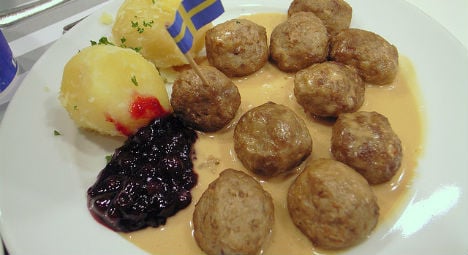Unlike in most countries, Ikea gives customers in its Norway stores the option of having a portion of vegetables alongside their meatballs, but charges extra for it.
Synnøve Grini, from the Norwegian Institute of Food Fisheries and Aquaculture research (Nofima) on Monday called on the Swedish flatpack furniture chain to drop the controversial vegetable charge, arguing it was a health hazard.
”Norwegians eat too few vegetables, and it is a problem,” she told Dagbladet. “Ikea should turn the tables and let customers pay extra for more meat, but have vegetables as a part of the dish.”
“It’s in the best interest of public health if vegetables are served with the meal,” agreed dieting expert Jeanette Roede. “Health shouldn’t be a ‘should I or shouldn’t I?’ choice.”
Swedish meatballs with mashed potatoes, brown sauce and lingonberry jam has long been the top selling meal at Ikea's 361 stores worldwide.
However, in keeping with Swedish tradition, vegetables are rarely served.
“Meatballs is a dish we serve globally in all of our stores. It is more or less the same in all markets,” Ikea Norway’s communication director Jan Christian Thommesen told Dagbladet. “The meatballs are based on a traditional Swedish recipe and vegetables are normally not served with the dish.”
Thommesen said that the company had now decided to change the dish so that Norwegian customers can no longer opt out of the additional vegetables.
“The change comes after a survey we did a while ago. We got a lot of feedback from our customers in Norway that they missed having vegetables with the meatballs and we have decided to listen to our customers,” he said.
“As a result, the dish will be ten kroner more expensive, which is currently the same price as a side order of vegetables.”



 Please whitelist us to continue reading.
Please whitelist us to continue reading.